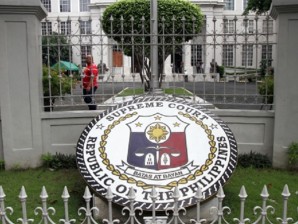High court affirms dismissal of civil raps vs Chingkoes
MANILA, Philippines—The Supreme Court has affirmed the Manila Regional Trial Court’s dismissal of civil charges filed by the government more than a decade ago against a couple accused of involvement in a P60-million tax credit scam.
The high court’s Third Division faulted the Bureau of Customs (BOC) and the Office of the Solicitor General (OSG) for their lawyers’ nonappearance at six hearings on the pretrial of Faustino and Gloria Chingkoe, which had led the Manila RTC to dismiss the case against them on July 14, 2006.
“We find the trial court’s dismissal of the case to be in order. As it were, the trial court amply gave respondent sufficient notice and opportunity to attend the pretrial conference but, despite this, it neglected its duty to prosecute its case and attend the scheduled pretrial hearings. Hence, the trial court cannot be faulted for dismissing the case,” read the Supreme Court’s July 31 decision written by division chair Justice Presbitero Velasco Jr.
Division members Justices Roberto Abad, Jose Mendoza and Marvic Leonen concurred in the ruling.
The justices, however, gave the government another chance when it modified the original RTC ruling to a “dismissal without prejudice.” This means the government, once it was truly prepared with its evidence, could file a new case against the Chingkoes without violating the double jeopardy rule.
Article continues after this advertisement“This is in view of the huge amount of tax collectibles involved, and considering that taxes are the ‘lifeblood of the government,’” the justices said.
Article continues after this advertisementThe Chingkoes were among several defendants in a consolidated civil case filed in 2002 by the BOC against Chiat Sing Cardbord Inc. and Filstar Textile Industrial Corp. owned by the couple. The two companies were accused of the fraudulent use of fake and spurious tax credit certificates (TCC) to settle the customs duties and taxes on their importations from 1992 to 1998.
The BOC, represented by the OSG, sought to recover the taxes and duties, exclusive of penalties and interest, from the two companies.
In 2005, both parties agreed to settle the case via mediation which, however, took a long time to complete, leading to the postponement of the pretrial hearings twice in January and February 2006.
The mediation ultimately failed to prosper and at the next pretrial hearing set by the RTC in March the same year, the OSG lawyer failed to appear. Another hearing was set for the following month, but the government counsels still failed to show up, leading the judge to reschedule the hearing for May.
The May hearing was canceled when the judge went on leave and a new hearing was set for June 30. On that day, however, only the BOC lawyer showed up and moved for another resetting.
The judge agreed to a new date, July 14, 2006. When no government lawyer appeared on that day, he dismissed the case.
The Manila RTC rejected the government’s motion for reconsideration so the BOC and OSG brought the case to the Court of Appeals.
In April 2008, the appellate court ordered the RTC to resume hearing the case, even chiding the judge for a “grave abuse of discretion” with the “swiftness” of his dismissal of the suit.
The Chingkoes then elevated the case to the Supreme Court, which sided with the couple and blamed the OSG and BOC for their “clear negligence and laxity” in handling the case.
“That the case involves the issuance of allegedly fraudulently secured tax credit certificates, and not an ordinary action for collection of money, is of no moment. This fact alone does not exempt respondent from complying with the rules of procedure, including the rules on appeal. Neither can respondent invoke the rule on technicalities yielding to the paramount interest of the nation, as the facts and circumstances of this case do not warrant such relaxation,” the Supreme Court ruled.
The cases filed at the RTC were the civil counterparts to the criminal charge of plunder filed by the Office of the Ombudsman against the Chingkoe couple, their business associates and Department of Finance officials. The scam was exposed by Faustino’s estranged brother Felix, a stockholder of the DKC Group of Companies that controlled Filstar.
Felix, who was granted immunity by the Ombudsman in 2004, claimed his brother and sister-in-law, in connivance with DOF officials, resold in the mid-1990s at least 573 TCCs worth P2.3 billion to firms that were not entitled to them.
In March 2011, however, the Sandiganbayan, citing the government’s failure to prove a conspiracy and enrichment by the Chingkoe couple, their business associates and the DOF officials, dismissed the plunder case stemming from the Filstar TCCs. An appeal of the dismissal is pending in the Supreme Court.
